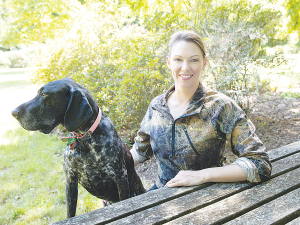Fish & Game NZ appoints joint CEO to guide reforms
The New Zealand Fish & Game Council has announced a leadership change in an effort to provide strategic direction for the sector and support the implementation of proposed legislative changes.
 F&G chief executive Corina Jordan says the policy recognises the valuable contribution anglers and hunters make to the country’s conservation efforts.
F&G chief executive Corina Jordan says the policy recognises the valuable contribution anglers and hunters make to the country’s conservation efforts.
OPINION: The National Party’s support for hunting and fishing recognises the valuable contribution anglers and hunters make to the country’s conservation efforts and the importance of trout, salmon and game birds to help feed families across the country.
As part of its hunting and fishing policy, the National Party has announced it will create a Hunting and Fishing Minister, support Fish & Game, protect trout and salmon fishing and give hunters and anglers a voice through permanent seats for hunting and fishing on the Conservation Authority and Conservation Boards.
The policy also guarantees access to public land for hunting and fishing.
Kiwis from all walks of life value access to New Zealand’s natural environment and fish and game resources. Angling and hunting are deeply embedded into the fabric of our rural communities, towns and cities across the country.
Mental health, wellbeing and the opportunity to spend quality time with friends and family in the great outdoors are the key reasons why New Zealanders and international visitors hunt and fish. Conservation, pest management, and the ability to feed their whānau are also major drawcards. That’s why we support any initiative that acknowledges and celebrates the contribution of anglers and hunters.
We are particularly pleased the National Party’s policy includes permanent seats for hunting and fishing on the Conservation Authority and Conservation Boards. Our anglers and hunters are at the vanguard of the country’s conservation efforts and deserve a greater voice and greater credit for their massive contribution.
It is also encouraging that the policy recognises there is a place in New Zealand’s eco-system for valued introduced species such as game birds, trout and salmon alongside other waterfowl and freshwater species.
Trout and salmon have some of the highest freshwater quality and quantity requirements out of our freshwater species. This has enabled Fish & Game to argue for water quality and quantity standards that have protected not just the species under our jurisdiction but all freshwater species, including those that are taonga and valued by mana whenua.
We’re pleased politicians from all parties are listening to us. Parliament’s Environment Select Committee recently recommended the Government enshrine the protection of the habitat of trout and salmon alongside the protection of indigenous species in the planned Natural and Built Environment Act.
Anglers and hunters are dedicated nature lovers and conservationists, protecting and rewilding New Zealand’s natural habitats, which is so important for future generations, she says.
Fish & Game and our licence holders are the country’s leading freshwater champions. We have an outstanding record of achievements in protecting and enhancing the environment, including creating, restoring and protecting wetlands.
We have been responsible for securing 12 of the 15 Water Conservation Orders, the highest level of protection that can be afforded to any water body. We have fought long and hard to protect our outstanding water bodies from pollution and exploitation so they are safe for swimming, gathering food and fishing. It is critical New Zealand’s policy settings reflect this and allow the vital work to continue.
Fish & Game is 100% funded by hunters and anglers – we don’t get a cent from the New Zealand taxpayer. This user-pays, user-says system contributes to the greater New Zealand good by protecting the environment, protecting and creating access for hunters and anglers.
Corina Jordan is chief executive of Fish & Game NZ
New Zealand and Chile have signed a new arrangement designed to boost agricultural cooperation and drive sector success.
New DairyNZ research will help farmers mitigate the impacts of heat stress on herds in high-risk regions of the country.
Budou are being picked now in Bridge Pā, the most intense and exciting time of the year for the Greencollar team – and the harvest of the finest eating grapes is weeks earlier than expected.
The Real Estate Institute of New Zealand (REINZ) has released its latest rural property report, providing a detailed view of New Zealand’s rural real estate market for the 12 months ending December 2025.
Rural retailer Farmlands has released it's latest round of half-year results, labeling it as evidence that its five-year strategy is delivering on financial performance and better value for members.
OPINION: "We are back to where we were a year ago," according to a leading banking analyst in the UK, referring to US president Donald Trump's latest imposition of a global 10% tariff on all exports into the US.